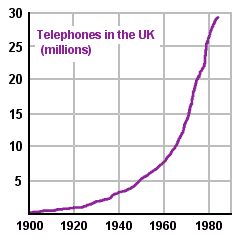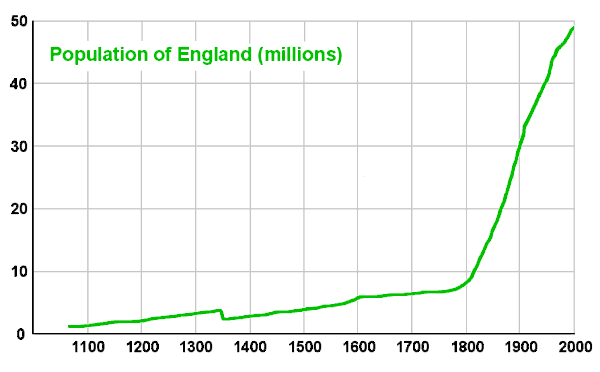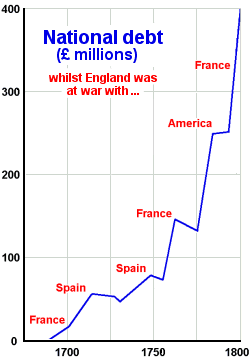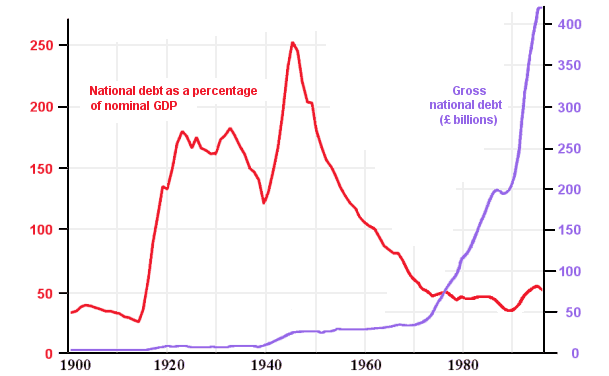
National debt and population
Here are two puzzles. Why is the world's richest country also the world's most indebted? And why did the UK population suddenly begin to grow explosively in about 1800? Maybe the two are somehow connected.

Some years ago I wrote a series of articles on the development of telephone technology, tracing how the first clumsy hand-built mechanisms of the 19th century had evolved into today's sleek electronic gadgets. Designing telephone systems was my trade, at the time. I wanted to add some historical perspective, so I included a graph to show how the number of telephones in the country had grown over the past century. I had expected that the graph would show a series of steps as each advance in technology improved quality and reduced cost. (I dislike the word 'breakthrough', which has become a label applied by desperate copywriters to skin creams and hearing aids and means 'almost exactly the same').
But when I drew the graph I was surprised to find that instead of steps it showed straightforward exponential growth. With a logarithmic scale, the graph would be a straight line. The total number of telephones was larger every year and so was the rate of increase, regardless of the technology. It's as though the little devils were breeding. In good times and bad, through wars and recessions, the number of telephones in the country has kept on growing exponentially.
That seems odd, and even senior managers in British Telecom believed that it couldn't go on for ever. Surely growth must stop, they thought, when there was a telephone in every room in every house, as well as in every office. But then some people installed phones in their cars, and then everyone started buying mobile phones, and then they bought mobile phones for their children. There's no end in sight yet. Exponential growth seems to be a law of nature.

So it never occurred to me to question whether or not the growth in the country's population follows the same exponential law. Everyone knows that the population increases every year, and it seems obvious that the larger it becomes, the faster it will grow. That's what happens with rabbits, isn't it?
Except I was wrong again (though not about rabbits, obviously). This graph illustrates the best estimates I could find of the country's population from the Norman Conquest right up to 2001.
The Black Death killed a lot of people in 1348, but apart from that, the graph is not a steadily rising exponential curve. It's two rather wobbly straight lines. Until 1800 there was a year-on-year increase of about ten thousand people in England. After 1800 this figure jumped to around a quarter of a million more people every year. Clearly, something unusual happened in England within one generation at around the end of the eighteenth century. What was it?
Paying for wars
War is a terribly expensive undertaking. Armies have to be paid, and so do the people manufacturing weapons and munitions. Traditionally, when the king wanted to fight a war he went and asked Parliament for more revenue. Kings must have been forceful, dynamic people who knew what they wanted and how to get it.
Here is a brief summary of our eighteenth century English monarchs:
Queen Anne (reigned 1702-1714) was a dull-witted, gout-ridden, Protestant churchgoer who grew so fat she had to be carried everywhere. In her time England was at war with Spain, and Marlborough was winning every battle he fought. England and Scotland united to became Great Britain.
George I (reigned 1714-1727) was imported from Hanover, in what is now north Germany. His claim to the throne was that his mother was the daughter of the sister of Charles I - but at least George was a Protestant! He delegated the chore of government to his ministers, so that he could spend more time with the odd-looking mistresses he had brought with him (who were known to the court as 'The Elephant' and 'The Maypole'). Peace unexpectedly broke out, leading to a temporary lull between wars.
George II (reigned 1727-1760) was George I's son, and another German import. His father locked up his mother and made sure that her son suffered too. Once he was king, he was content to leave the government to do the governing (which included wars with Spain, then France) and yet at the age of 61 he led the English Army gloriously into battle against the French.
George III (reigned 1760-1820) was the grandson of George II (his father Fred had died as the result of a freak cricketing accident. You couldn't make it up.). He spoke English, even to the trees in Windsor Park. During his reign the English fought France (a victory) and America (a major defeat) and then France again (eventual victory). He lived in a modest house, commuted to work, and his hobbies included reading and farming.

So it was actually the government who chose to fight a war, and Parliament obediently raised the money by agreeing that citizens must pay higher taxes.
But then the 18th century brought a new twist. Someone had a brilliant idea - instead of simply increasing taxes, which raised the money but annoyed the voters, the government asked politely if it could borrow some money for a little while. Naturally, the lenders would get their money back in a few years, and naturally they would receive regular interest on the loan. It was a 'win-win' situation - the government got the money it needed, and the citizens were rewarded instead of punished.
The graph shows how England's national debt rose alarmingly through the 18th century (using figures collected in 1800.) All these wars were largely financed by government-backed IOUs.
Yet somehow, after the century of fighting, the country was wealthier than it had ever been. Napoleon, in exile on St. Helena, noted sadly that his battle plans had been defeated by English gold. But at the same time, there were men in government who felt uneasy about the situation, and they devised new and ingenious taxes to help repay some of the debt. Parson Woodforde was taxed on the number of windows he had, and on his servants, and even, poor chap, for being unmarried.
Where does money come from?
Most people think that, if they borrow money, someone else must be lending it. I did, and I was alarmed when I discovered what was really going on.
If you borrow £10,000 from a bank (to buy a car, say) it stands to reason that some rich person has previously deposited £10,000, or the bank wouldn't be able to lend it to you. Actually, this isn't quite true. Banks wouldn't make much money that way. What happens is that when the rich person deposits £10,000, the banking system suddenly has nine times as much - that is, £90,000 - to lend out! How can this be possible?
The key idea is that a bank need only keep 10% of its deposits on hand at any one time. So if an extra £10,000 is deposited, £9,000 is immediately available for loan. When the person who borrowed this money spends it, another bank gets a £9,000 deposit. The new bank puts 10% - that is, £900 - into its own reserves, and lends out £8,100. The next bank hangs onto £810 and lends £7,290 - by now there's an extra £24,390 in the economy - and the process ripples on until, by the time it's over, the banks have lent out an extra £90,000.
You may object that this is ridiculous. What would happen if the chips were down, and the banks had to repay all the money deposited with them? The answer is (as Sir Humphrey pointed out) that it's the Bank of England's job to make sure that the chips stay up. Panics like this simply can't be allowed to happen.
By controlling the interest rate, the Bank controls the probability that people will give in to the urge to buy a new car. More important, it maintains people's confidence in the stability of the system, which makes it highly unlikely that the bank's depositors would all appear at once to demand their money back. Why should they, as long as the bank continues to pay them a satisfactory rate of interest?
Of course, if depositors began to suspect that they might not get paid, the entire world economy would collapse like a house of cards ...
When the bank agrees to loan you £10,000 to buy a new car, it's not lending you someone else's money. The cash you borrow comes from a pool of potential money - the difference between the amount the bank has on deposit and the much larger sum it is allowed to lend out. As soon as you sign the loan agreement, the money abruptly becomes 'real', at least as far as the bank is concerned. Look at a bank's balance sheet, and see what they list as their assets. Typically, you might see 'Cash: £10m', 'Fixed assets: £200m', and 'Loans: £30,000m'. The loans are assets? But the bank created them! They're not real in the way that your new car is real. But the bank sees your new debt as a new asset because for the bank it is a real new source of revenue - you've promised to pay the interest.
You walk out of the bank with a stack of £20 notes (that you don't own), swap them for the car (that you then do own), and this £10,000 of new money appears as a deposit in the dealer's bank account. It has just popped into existence, as if by magic. Bank managers and credit-card companies create far more 'money' than the Royal Mint. They have been doing it for centuries, and the result is that by now only about 4% of all the 'money' in the country is real £20 notes. The other 96% is just unpaid debts.
National debt
Governments borrow money all the time. When a government needs £10 billion to fight a new war, it simply prints a piece of paper and sells it (to us, via our pension funds) for £10 billion. Even though it earns interest like real money, it's just a piece of paper. Government did nothing to earn this money. Nothing useful has been discovered or invented. No new wealth has been created. Government simply called new money into being, like summoning the Genie of the Lamp. But unlike the Genie, this new money has to be paid for, and that's the taxpayers' responsibility. At some point taxpayers may even have to repay the capital, but by then the politicians who issued the debt will be safely retired or dead. Thomas Jefferson wrote that it was morally irresponsible to incur debt that could not be repaid within a generation. Yet later on, when he was President, he changed his mind and borrowed $12 million to buy Louisiana from France (but let's not forget that the French colony of Louisiana covered an enormous area, including what is now Louisiana, Mississippi, Arkansas, Missouri, Illinois, Iowa, Wisconsin, Minnesota and even parts of Canada. Jefferson knew a bargain when he saw one.) That debt has still not been repaid, 250 years later. The US national debt rose to the stratospheric level of $7,400,000,000,000 in 2005. In 2008 it passed $10 trillion, and the National Debt Clock in Times Square ran out of digits. Repayment doesn't look likely any time soon ...
The present national debt of the UK is £400 billion (2005), which may be small compared to the USA's but is still a gigantic amount of money. Does it matter? The current President of the USA doesn't think so, but the current Chancellor of the Exchequer strongly disagrees. They can't both be right - or can they? I tried to find out, but it seems that the economists don't know either. Some argue that it is no more than common sense that a country should balance its budget. Others point to the undeniable truth that whilst the National Debt accelerated skywards during the 18th century, so did the country's wealth, as the Industrial Revolution took off.

There is a sort of consensus amongst economists that what matters is not so much the actual level of debt but the proportion of national income needed to service it. It's a credibility issue. With national debt at say, 50% of Gross Domestic Product (GDP is basically what the country earns), the government could say, 'Well, yes, we could pay it off if we wanted to - but we don't want to'.
If debt exceeds GDP (as it did in the UK for 50 years after 1918; in the peak year of 1947, debt was two-and-a-half times bigger than GDP) then this is a much trickier argument to sell. Potential buyers of government stock might prefer to put their money elsewhere unless the rate of return looks very attractive - but if it does, taxes will probably have to rise to pay for it, and then the economy will slow down, and then the government might be forced to borrow even more, and round and round we go.
On the other hand, who knows? If the economists can't agree, maybe we should trust the politicians. At least they want to get re-elected.
The bottom line is, debt seems somehow to create wealth. And a wealthy country can feed its citizens more, so maybe the national debt really did have something to do with population growth.